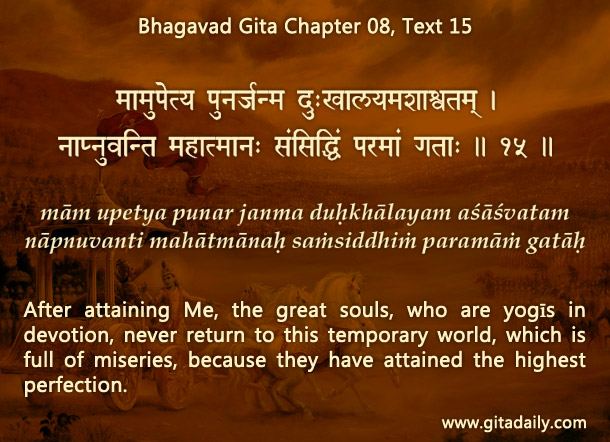Suppose an election candidate has a chequered past but has thereafter done much laudable work. One newspaper may write about him: “Although he is doing good work now, he has made mistakes in the past.” Another newspaper may write: “Although he has made mistakes in the past, he is doing good work now.” What the newspapers focus on reveals their position, their agenda, their purpose.
Our focus shapes not only what we say, but also what we read. By quoting the Bhagavad-gita (08.15) verse that this world is a place of misery, some people portray the Gita as a pessimistic book. However, the verse’s purpose is positive: Those devoted to Krishna never return to this miserable material world, but attain his eternal abode. Its thrust is to stress bhakti’s elevating and liberating potency. To contrast the destinies of those who practice bhakti and those who don’t, it passingly refers to this world as a place of misery.
The Gita’s optimistic, uplifting purpose becomes even more evident from its overall context. It starts with Arjuna in devastating distress (02.01) and ends with his composure restored (18.73). The Gita doesn’t respond to his distress by saying, “This world is a place of misery – stay miserable.” Far from it, Gita wisdom raises Arjuna above distress by sharing a sublime spiritual worldview. The Gita’s essential worldview is: We are at our core indestructible souls and are meant for a life of eternal love with the all-attractive supreme, Krishna, whose parts we are eternally. Arjuna’s transformation from distress to determination demonstrates that a spiritually optimistic worldview helps us transcend life’s inevitable miseries.
The Gita guides us to focus on loving and serving Krishna and to contemplate the world’s distress-filled nature for preventing worldly things from becoming our focus. Internalizing this devotional focus infuses our life with the supremely positive purpose.
To know more about this verse, please click on the image
Explanation of article:
Podcast:


our focus must be on KRISHNA BHAKTI only
the verse’s purpose is positive: Those devoted to Krishna never return to this miserable material world, but attain his eternal abode. Its thrust is to stress bhakti’s elevating and liberating potency.
This is also visible from overall context. distress to determination of Arjuna
Also Krsna wants us to know the distressed nature of this world, so that it does not become our focus